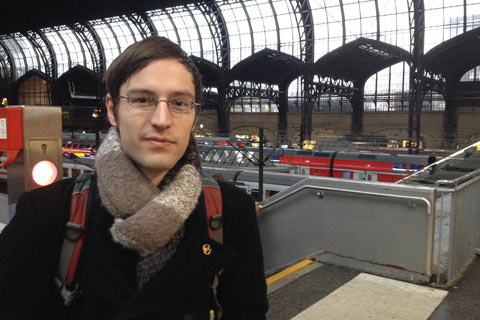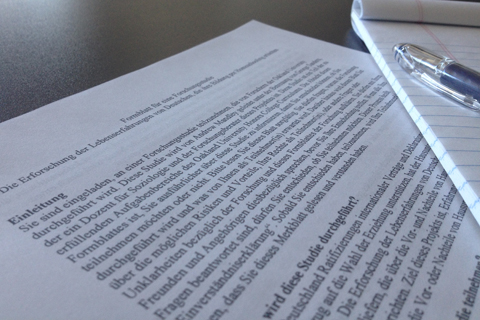
 |
| Andrew Mandley will present his research along with fellow Honors College seniors at the end of March. Mandley spent 12 days in Germany conducting research that he hopes will open a dialogue about the legality of homeschooling in Germany. |
Homeschooling is illegal — in Germany, at least.
That’s where senior Andrew Mandley spent the first 12 days of January conducting research on life after homeschooling. As part of his senior thesis for the Honors College, he spoke to six young adults that were previously homeschooled, and gathered their political, civic and social experiences after secondary school.
“It’s a technicality,” Mandley said. “It’s not illegal to homeschool, it’s just illegal not to go to school… you can learn at home too, but not instead of public education, is the way that it’s framed.”
The consequences of school truancy can vary, according to Mandley, generally beginning with heavy fines and sometimes leading to imprisonment of parents or the relocation of children.
The homeschooling movement over there is fairly young, he said, with roughly 400 families currently homeschooling.
He hopes to get a conversation started with his research.
From concept to country
Mandley is majoring in Human Resource Development, but that doesn’t really matter when choosing a thesis topic, according to Dr. Graeme Harper, dean of the Honors College.
“The Honors College thesis is a fairly individual project,” Harper said. “It’s very much based on, ‘What would I like to achieve with my final project while at Oakland?”
Germany has always interested Mandley and was the main draw for this study. He started learning German at a young age, spent some time at Germany in high school as a foreign exchange student and has a German Language minor. He knew he wanted to visit again and thought research would be the perfect opportunity.
He was homeschooled for a time as well, and was already familiar with some of the workings of homeschool regulations.
Unsure of what to research, he contacted the Home School Legal Defense Association (HSLDA), an advocation agency based in the U.S. Through this agency Mandley learned that while there have been studies on active homeschooling in Germany, there have not been studies on life after homeschooling. He decided to go with that course of study.
“It’s distinctive, it’s not a project that I would have thought of,” Harper said.
Before Mandley could move ahead, he had to go through the Institutional Review Board (IRB), since the study would be targeted at international people that had previously engaged in an illegal act. It took nearly a year before Mandley’s research was approved – leaving little time for the actual study.
Next, he had to find willing participants.
“It’s very difficult to find these people,” Mandley said. “Obviously they don’t want to be found because they were previously engaged in, over there, an illegal activity.”
The HSLDA helped him find and connect with six volunteers, each of whom he traveled to visit in that 12-day span.
A matter of culture
The volunteers, most in their mid-20s, shared their experiences with Mandley, and he is now pulling from those experiences to find a trend. So far, their experiences are similar to what he has noticed in American, Canadian and British research.
“They don’t seem at any particular disadvantage, except in the sense that they have been kind of cut off from society, because they have to hide,” Mandley said. “None of them want to hide; they all wish it was legal.”
All of the participants were independent thinkers and were open-minded, Mandley said.
 |
| Combining an interest in German culture and homeschooling, Mandley's research looks at an area that the Home School Legal Defense Association says hasn't been studied — life after homeschooling. |